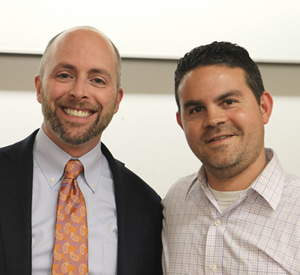In the two years since the 2016 election of President Donald Trump, many voters have anticipated this week's midterm elections. Will a "blue wave" rise up to capture majorities in the U.S. House and Senate to challenge Trump's executive power, or will Republicans solidify and expand their control in Congress?

Expecting an increased interest in elections, Seattle University School of Law added a new constitutional law class to the schedule this semester — Voting Rights and Election Law. Students and the two adjunct professors who co-teach the course said it couldn't be timelier.
"That's the struggle," says Professor Chris Casillas '03. "You have to cover all the foundational material but you could spend the whole time talking about current events."
Casillas and co-Professor Ryan Harkins structured the constitutional law class to cover the history of suffrage, landmark voting rights cases at the U.S. Supreme Court, campaign finance laws, and even cybersecurity issues related to voting.
But along the way, they've also touched on the topics that pop up daily in the news — allegations of voter suppression efforts in North Dakota, Kansas, and Georgia; reports of voting machines changing people's ballots in Texas; gerrymandering in North Carolina and Pennsylvania; and special counsel Robert Mueller's investigation of the Trump 2016 campaign.
Casillas, who has previously taught three other courses at the law school, works for the state of Washington's Public Employment Relations Commission. His passion for teaching constitutional law stems from studying political science for his PhD at Cornell University. Harkins serves as director of state affairs and public policy at Microsoft and was active in the company's "Defending Democracy" project, which aims to prevent hacking and encourage advertising transparency.
The two professors, who are neighbors in West Seattle, developed the idea for the voting rights course in a series of backyard conversations.
"Voting is one of the most critical components of a democratic system," Casillas said, explaining that voting in the United States is governed by a complex amalgamation of processes and laws that vary state by state and even county by county.
The upper division class has appealed to students interested in constitutional law, political science, and even technology law, since it includes coverage of cybersecurity issues.
It's a particularly important time to study voting rights, Harkins said, since a growing number of restrictions on ballot access have been proposed or implemented across the country. Restrictions are usually aimed at preventing voter fraud, which is in reality almost non-existent.
"The story of suffrage in this country has not been a smooth one," he said. "Early in our history, voting was largely restricted to propertied white men, and since then we've gone through ebbs and flows from expanding access to restricting access."
One thing is certain: the class will still have plenty to talk about even after Tuesday's elections are over.
"The story of democracy in this country isn't finished," Harkins said.
